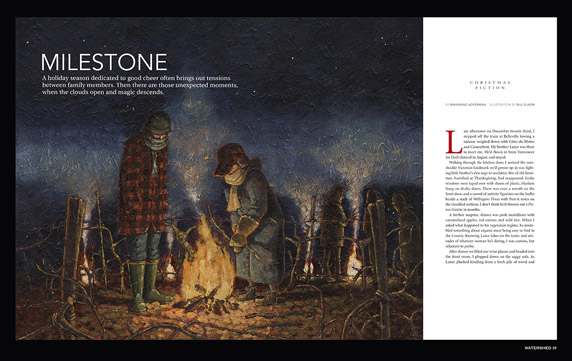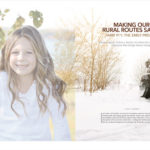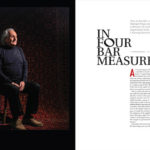
A holiday season dedicted to good cheer often brings out tensions between family members. Then there are those unexpected moments, when the clouds open and magic descends.
Late afternoon on December twenty-third, I stepped off the train at Belleville towing a suitcase weighed down with Côtes du Rhône and Camembert. My brother Lance was there to meet me. He’d flown in from Vancouver for Dad’s funeral in August, and stayed.
Walking through the kitchen door, I noticed the ramshackle Victorian landmark we’d grown up in was fighting little brother’s Zen urge to unclutter. Bits of old furniture, banished at Thanksgiving, had reappeared. Leaky windows were taped over with sheets of plastic, blankets hung on drafty doors. There was even a wreath on the front door, and a crowd of nativity figurines on the buffet beside a stack of Wellington Times with Post-it notes on the classified sections. I don’t think he’d thrown out a Picton Gazette in months.
A further surprise, dinner was pork medallions with caramelized apples, red onions and wild rice. When I asked what happened to his vegetarian regime, he mumbled something about organic meat being easy to find in the County. Knowing Lance takes on the tastes and attitudes of whatever woman he’s dating, I was curious, but reluctant to probe.
After dinner we filled our wine glasses and headed into the front room. I plopped down on the saggy sofa. As Lance plucked kindling from a fresh pile of wood and proceeded to build a fire, I couldn’t resist pointing out the fireplace had been declared unsafe years ago. His answer surprised me.
“Guess how much this place is insured for? Five hundred and fifty thou.”
“Lance! Are you hoping the house burns down? That’s awful! You know, Dan said the chimney needs…”
“Our big brother says a lot of things when it suits his advantage. Have you talked to him lately?”
Of course I hadn’t. A phone call from a Cameron male can only mean there’s a crisis. Keeping in touch is woman’s work.
“I thought you two were thick,” he said. Jabbing at his precious fire, Lance let me wait, clearly savouring some morsel of news. I refused to bite. Finally, he said, “You didn’t hear this from me, okay? Seems the marriage of the century has hit turbulence. Dan says he may need to move in here.”
I was already sitting down… thought I might have to lie down. Losing our 82-year-old father in a freak accident was bad enough. Life without the bedrock of Dan and his wife Edie seemed unthinkable.
“I hope they don’t split up,” I stammered. “That would be just so, so awful. What kind of a family would we have? None, to speak of.”
Part of me wanted to know more, but a bigger part didn’t, at least not from footloose and fancy-free Lance, still boyish at 44 and always brimming with opinions. He’d settled himself in the striped smoker, Dad’s favourite chair. Sitting cross-legged, arms folded, he looked and sounded freakishly like the late Harold Cameron.
“Yeah, well getting hitched too young never works out,” he declared. “Better to be at least 40, or wedlock doesn’t stick.” The voice of inexperience never falters.
Suddenly I felt cold. I drew a chair close to the fire. The heat soon warmed my face and knees but didn’t touch the penetrating chill inside. An occasional waft of dark fumes billowed from under the ancient mantel. My eyes watered, maybe from the smoke, maybe not. I went upstairs to look for a sweater.
Every step creaked. The door to the master bedroom was half open. I went in. There was a picture of Mother on the dresser, a formal studio portrait taken when she was in her mid-50s, before she got sick, her hair sprayed into one of those hat-like domes popular at the time. She was wearing a string of pearls I’d never seen before. Her passing twenty years ago had felt like a supporting beam removed from the house. The structure held, but just. It struck me that over time Edie had stepped into her place, through simple acts of generosity, cooking, and quiet compassion. Dan, Lance and our sister Jean, and to some extent me – we were bigger personalities, but we counted on Edie to draw us together.
Somehow, she’d become part of my creative life, crossed the line between County and city. She read various drafts of my manuscripts, made helpful comments and still got excited about the final outcome in book form. The long slow process of writing literary fiction often feels more like a personal project than a grand cause. For Edie, The Novel – at least my novels – was always important.
Every Cameron family Christmas has a milestone – a novelty drink, new board game, or visitor – marking it out from the others. I hoped this one wouldn’t be our painful Skype conversation with Jean in Rwanda, or rumours about Dan and Edie. On Boxing Day, my wish came true, although it started with all the markings of disaster. Lance had prepared supper at the farmhouse, announcing the theme as ABT: Anything But Turkey, which pleased Dan and Edie’s boys. After they went off to a skating party, Dan poured a round of digestives. It started with a remark by Lance, intended as a compliment.
“Edie, your working like a maniac clearing up the old house,” he said. “I can’t get over your energy. Are you on some kind of pep pills?”
“You look great, Edie” I added. “The new hairdo suits you.”
Cut shoulder length, layered with blond highlights, her hair seemed to take up more space, and definitely made her look younger. I thought she’d lost weight too and said so. Not that she’s fat, just a mother of three who loves to cook. The few extra pounds weren’t noticeable until she lost them.
Edie blushed. Dan got up abruptly, headed for the kitchen with his plate and mine. Never in the history of Dan-kind has anyone seen our older brother attempt to clear the dinner table. We just sat there, watching in silent awe. Through the window, I noticed Dan’s head go bobbing by outside, so I grabbed my coat and ran out. He was stalking toward the vineyard, fists clenched.
“What’s going on?” I asked, catching up.
“Nothing. I just need some air.”
I had to trot to keep up.
“Where are you going?”
“For a walk.”
“You’re not wearing a coat. You’ll freeze to death.”
He stopped, as if the thought had not occurred to him, and looked back at the house. Then he pivoted, headed for the front door. Lance and Edie were in the kitchen, doing dishes. I followed Dan into the front room, where he reached for the bottle of whisky in the china cabinet. I was about to recommend caution when his phone rang. The conversation was cryptic, full of exclamation marks and mild swearing.
Hanging up, he shook his head. “Temperature’s sinking. Going to be forty below tonight. Bad news for the vines.”
I asked if there was anything to be done. He shrugged, took out his phone and started putting out calls for help.
THE EARTH’S CLIMATE is definitely growing warmer, but the night we spent trying to save Dan’s precious vines from a killing frost set a twenty-year record low. Those were the early days of County vineyards, when only a few growers hilled soil over fruiting branches tied to the lower trellis wires. It’s common practice now, expensive and an awful lot of work. After three consecutive mild winters, Dan hadn’t bothered this year.
The ground remained wet until early December, so the vines had been lulled into a false sense of security. As Dan explained it, the lake has a moderating effect. The vines were at the top end of a long sloping field, so theoretically, cold air should have lifted. But if the wind dropped, the cold could potentially settle in and snuff the life out of tender shoots.
I had a full range of ski clothes in Toronto but had never felt the need to bring them to the County. Nor was Lance’s wardrobe up to the task. So we dressed like jovial scarecrows in Dad’s hodgepodge collection of woolly long johns, overcoats, hunting socks and rubber boots. A handful of Dan’s friends joined the effort, mainly people who helped out with the harvest. They seemed to know exactly what was in store. Lance and I didn’t. Despite the doom in Dan’s voice, a collective sense of excitement gathered as we filed out into the night.
While we waited under the old apple tree at the top of the field, a truck full of propane heaters arrived. The thinking was that hot smoke would settle low on a windless night. Apparently, we were going to warm up the entire outdoors. In addition to lighting propane heaters, we had to build dozens of small fires out of straw and dead wood Dan kept along the fence lines for just such an emergency. I wondered how much science lay behind these plans, but questions seemed churlish.
By four a.m. the propane had run out. Dan called us together to say the temperature was still dropping, we’d have to start working on Plan B: a huge, roaring bonfire of straw bales, which his crew had assembled while the rest of us worked. When the stoves had been gathered up and taken away, Dan doused the pile of straw with fuel and lit it. We all gathered around an enormous blaze, and for the first time in hours, lowered our burka-like head coverings and looked each other in the eyes. I could tell Lance was skeptical but mercifully refrained from comment. A few minutes later Edie arrived with thermoses of coffee and shortbread cookies. As we stamped our feet and passed the mugs around, the night sky dissolved into a cold, grey hue.
Through it all, Dan never stopped working, fretting. He kept walking up and down the rows, as if they were hospital beds in a war zone, peering down at his beloved vines.
It occurred to me that this whole vineyard craze – at least for the sons of generational farmers – was turning out to be some kind of cruel revenge. Just when we’d all been fully inoculated against one of the most difficult means of earning a living on the planet and made other lives, along comes the ‘viticulture’ vogue and snatches up our eldest male. Despite his youthful rebellion against the land, Daniel Cameron was smitten. The heartbreak of farming, by times as merciless as the writing life – we have that in common, I thought, watching him gaze at the field. So much effort. So many ways to go wrong. It was daylight by the time we walked back to the house in silence, single file. The air felt even colder than it had all night, though there was no way of telling whether the sensation was an accumulation, or some new threshold. I was so tired I was afraid I’d keel over.
Edie had gone on ahead. As we trooped into the kitchen, the delicious aroma of breakfast greeted us, a generous spread of eggs, bacon, toast and coffee. We ate like lumberjacks and laughed off the night’s effort. I couldn’t help thinking that this is how farmers have kept going for centuries, by facing up to the truth of the calling. In its inevitable crisis moments, working the land is never a solo act. More than likely it’s a family effort.
My bones ached as I sank into the old sofa, but it was a fine kind of exhaustion. Edie brought me a cup of chamomile tea. As I searched her expression for a hint of what she might be hiding, her smile stayed as true as ever. In that moment, I was sure Clan Cameron – born and married in – would survive whatever the future had in store. This Christmas might even go down in history as one of our best, the night we all pulled together for a cause as old as the hills.
Editor’s note: A novelist and playwright living in Montreal, Marianne Ackerman was born and grew up in Prince Edward County, where she spends every summer. Milestone is adapted from her forthcoming novel, The Four Legged Table, which will be published next year. www.marianneackerman.com
Story by:
Marianne Ackerman
Illustration by:
Bill Slavin


